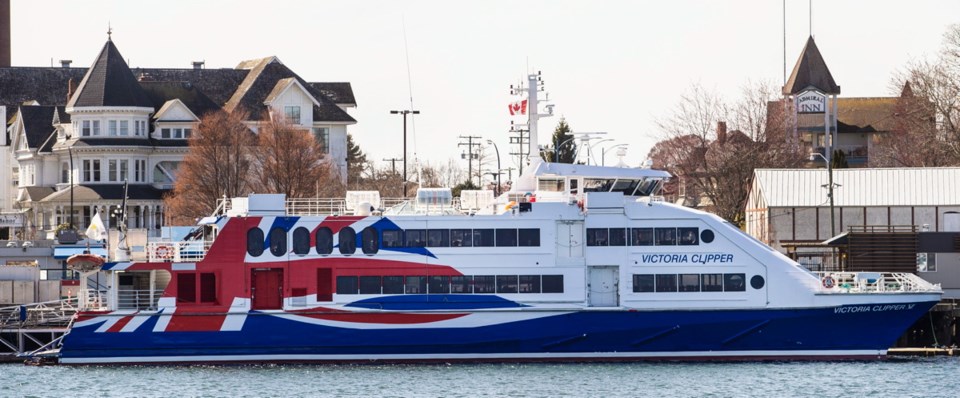Clipper Vacations is considering putting its ferry service between Victoria and Seattle on hiatus as a result of reduced demand during the COVID-19 outbreak.
Dave Gudgel, Clipper’s chief executive, said all options are on the table after Prime Minister Justin Trudeau signalled Monday that Canada is stepping up its response to the outbreak by closing its borders to most foreign nationals except Americans.
“We had already decided we wouldn’t run [today] and Wednesday, and we will take the information we received today and look at what it means going forward,” he said. “We will come out with a statement in the next few days with any changes to the schedule based on that.”
Asked if that could mean temporarily cancelling all trips between Victoria and Seattle, Gudgel said it was a possibility.
“Everything is a possibility and we’ve seen in this situation that we need to consider everything,” he said. “Things you would have thought were unthinkable a couple of weeks ago are now things you have to consider.”
Gudgel said passenger numbers have been diminishing over the least few weeks, though the company was intent on being a part of what the province deemed an essential service to the Island.
“But this is changing so quickly that we go right from that to trying to determine whether or not we can run,” he said.
At this point, the Clipper’s next scheduled sailing is Thursday, but after that, it’s up in the air.
“All of that is being reviewed,” Gudgel said, noting in 34 years in business and through 9/11, SARS and norovirus scares, the company has never seen anything like this.
“The issue around this is how quickly it’s changed and the ambiguity of not knowing how long this would last.”
The pace of change makes it difficult to determine what’s going to happen or quantify the potential damage, said Paul Nursey, chief executive of Destination Greater Victoria. “I think we need to be realistic that in the short term, there will be significant pain, but we will take our lead from health authorities and regroup,” he said. “I expect significant stimulus from senior levels of government focused on small- to medium-sized business. That is our core product. I do know that behind the scenes, key industry associations are coalescing around one common ask.”
Nursey said it’s hard to find a comparable situation to the COVID-19 outbreak, but he recalled that after the 9/11 attacks, the number of visitors dropped off for a few months.
“Then people started to travel again. These are different situations, but I do see some loose parallels, as both were related to health and safety,” he said.
The other key marine-transport companies in Victoria are taking steps to maintain service and provide a safe option for travellers. Black Ball Ferry Line’s Coho car ferry, which runs daily between Victoria and Port Angeles, will continue to run twice a day.
Black Ball vice-president Ryan Malane said they have adjusted their schedule to concentrate on essential services — getting Canadian snowbirds back from the U.S.
“That’s the majority of our traffic right now,” he said, adding commercial business has picked up considerably.
To improve social distancing on board, the Coho has reduced its capacity to 500 people, and the U.S. Coast Guard has allowed the company, on a case-by-case basis, to allow people to isolate themselves on the enclosed car deck.
“We are doing our best to maintain our services so people can get home and commercial traffic can continue to flow freely across the border,” said Malane.
B.C. Ferries has not capped its load limits so far. “It’s a balancing act,” said chief executive Mark Collins. “If we feel we can provide a safe and healthy environment, we don’t want to enact any measures that might impair economic activity, because we will need a strong economy to come out of this.”
B.C. Ferries is also a major commercial link for the Island — its vessels carry as much as $8 billion worth of commercial products every year.
So far, Collins has not received any directions from health authorities to limit passenger numbers.
The largest vessels in the fleet, the Spirit Class, which run between Tsawwassen and Swartz Bay on B.C. Ferries’ busiest routes, can accommodate just under 2,100 passengers and crew.
Collins said they have seen their numbers soften significantly, by as much as 20 per cent, in the last week, which has allowed for more distance on board the vessels.
B.C. Ferries has activated its pandemic plan.
The corporation is in Phase 1 of the five-phase program, which involves increased communication with staff, enhanced cleaning and monitoring employee health.
Collins said the plan has been around for years, and was first developed to deal with norovirus, then SARS and now is a pandemic plan.
“We practise it regularly and have really used it,” he said, noting it has been enacted as many as four times in the last 10 years.
It has also been enacted, in part, each spring to deal with flu season.
Collins said the five-phase program has never gone past level three, which includes enhanced cleaning, reducing crews, reducing sailings, eliminating non-essential activities and shutting down food operations.
A copy of the plan, obtained by the Times Colonist, shows level five includes reducing hours of operation, restricting passenger travel, considering carrying goods only, mandatory use of masks, selective screening for sick passengers, and quarantining of passengers and crew on northern vessels.



